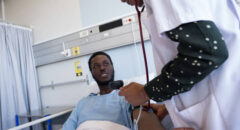
Sponsored by Vertex Pharmaceuticals Incorporated
African Americans account for 13% of the U.S. population. However, they are almost 4 times more likely to develop kidney failure than white Americans. There are many reasons for the greater occurrence of kidney failure in African Americans, including higher rates of diabetes and high blood pressure and poorer access to healthcare. In addition, genetic variations that are more common in African Americans can increase the risk of kidney disease.¹
What is APOL1?
In 2010, scientists found that higher rates of severe kidney diseases in African Americans could be related to a gene called APOL1. Everyone has the APOL1 gene. It protects against a parasite called trypanosome, which can be found in parts of Africa.²
What is an APOL1 variant?
Some trypanosome parasites can cause a disease called African human trypanosomiasis, or “African sleeping sickness.” Having protection from African sleeping sickness is an advantage for people that live in areas where this parasite is found. Versions (called “variants”) of the APOL1 gene evolved to protect against African sleeping sickness. But APOL1 variants may increase risk of some forms of kidney disease.
Today, people of recent African ancestry may carry these APOL1 variants. This includes people who identify as African American, Black, Caribbean, Sub-Saharan African, and Latino/Latina (Cuban, Mexican, Puerto Rican, or South or Central American).³
What is APOL1-mediated kidney disease (AMKD)?
AMKD is a severe type of kidney disease caused by certain APOL1 variants. It can lead to kidney damage and impair the kidneys’ ability to filter blood. This leads to high amounts of protein in the urine (or proteinuria) and decreases the kidneys’ ability to function. AMKD can cause symptoms such as fatigue, swelling in the legs and feet, and weight gain.³
Many people live with APOL1 variants and never develop kidney disease. But in some people, an infection or injury can trigger the kidney disease to progress.
People who have more than one copy of an APOL1 variant are at greater risk of kidney disease. Nearly 1 in 5 people with two copies of the APOL1 variant will develop kidney disease and are also at higher risk of developing AMKD. Because you share some of your DNA with your blood relatives, APOL1-mediated kidney disease can be passed down through generations and can affect many people within the same family.
How do you know if you have or are at risk of AMKD?
There are a few tests that doctors use to assess risk for and diagnose AMKD. They may include blood and urine tests to check for proteinuria and to measure kidney function. A genetic blood test is also needed to see if a person has any APOL1 variants.³
How is AMKD treated?
There are currently no approved treatments that address the underlying cause of AMKD. Managing symptoms is the current focus of treatment, including:
- Prescription medicines to help control high blood pressure
- Diuretics to help the body get rid of extra fluid and salt
- High-dose steroids or other medicines that suppress the immune system to stop or slow the disease from progressing (because they often cause severe side effects, these medicines are only used for short periods of time)
Even with treatment, people with AMKD almost always develop kidney failure. Kidney failure may be treated with regular, long-term dialysis or a kidney transplant, both of which require lifelong treatment and follow-up.³
What can I do to protect myself?
You may not have symptoms in the early stages of AMKD, so it is important to see your doctor regularly and talk with your doctor about kidney health, any family history of kidney disease, and factors that may put you at risk of AMKD.4 Early detection of AMKD may help you and your doctor choose appropriate treatment, identify potential risk to other family members, and stop or slow more rapid disease progression.
There are clinical studies underway that aim to address the underlying causes of AMKD. If you are diagnosed with AMKD, talk to your doctor to see if joining a study is right for you.
At Vertex, we work on diseases where there is high unmet need for new treatments. Our scientists use their understanding of biology to research and discover potential medicines with the goal of treating the underlying cause of diseases, including APOL1-mediated kidney disease (AMKD). To learn more about Vertex, please visit vrtx.com/en-us.
1 National Institute of Diabetes and Digestive and Kidney Diseases. Race, Ethnicity & Kidney Disease. Updated March 2014. Accessed March 18, 2021.
www.niddk.nih.gov/health-information/kidney-disease/race-ethnicity
2 Friedman DJ, Pollak MR. Genetics of kidney failure and the evolving story of APOL1. J Clin Invest. 2011;121(9):3367–74.
4 https://aakp.org/center-for-patient-research-and-education/causes-of-kidney-disease/apol/








